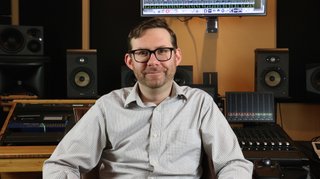SVG Sit-Down: Dale Pro Audio’s Joel Guilbert on the Company’s New RF Solutions Group
The effort aims to help wireless clients adjust to ongoing spectrum turmoil
Story Highlights
The RF universe was upended three years ago with the auction of the 600 MHz spectrum, as the FCC dug deeper into the ether to accommodate the rapidly expanding wireless-device landscape and after an earlier, government-mandated frequency reallocation had vacated much of the 700 MHz range in 2008. The pro-audio business saw the wireless-systems–manufacturing community respond quickly, adjusting existing and creating new wireless products in spectrum on either side of the now-vacated 600 MHz range, an effort supported by nearly constant give-and-take with the FCC and other regulatory agencies, as well as with end users, including sports broadcasters.
But that might have been the easy part.
The next challenge was managing the remaining constrained spectrum, and the complexity of that, compounded by a lack of government-mandated tools promised but never delivered, has made for few takers. Dale Pro Audio, which has been guiding RF customers throughout this spectral anxiety, has now taken that mission one long step further with the establishment, in September, of its RF Solutions Group, a nationwide team of RF specialists to address wireless challenges, including wireless microphones, intercom systems, video, telemetry, IFB, and large-scale RF distribution projects. Dale Pro Audio Technology Development Manager Joel Guilbert sat down with SVG to discuss what it all entails.

Dale Pro Audio’s Joel Guilbert: “Proper RF coordination is becoming a must; there is no more just turning on your transmitters and receivers.”
Two major trends have affected wireless-audio operations: the loss of the 600 MHz range and the rise of live events since the 2008-09 recession. How have these dynamics impacted the RF environment, particularly for broadcasters?
It has made a large impact: the [increasing number] of wireless [devices] — not just mics but IFB and intercom, cameras — are all being squeezed into a shrinking area. Luckily, technology changes, like digital transmission, are allowing more spectrally efficient transmitters; people are taking advantage of more unused spectrum like the VHF realm.
Sports on television increasingly use RF microphones on athletes. How much more complex is RF in the era of “miked up?”
Proper RF coordination is becoming a must. Now you need to do a spectrum analysis when you roll up to a venue; there is no more just turning on your transmitters and receivers and expecting them to function.
Dale Pro boasts “a nationwide team of RF specialists.” Who are they, how are you coordinating them, and what are the challenges of trying to do what is often a hyperlocal activity on a national scale?
Dale Pro has a big advantage, having been in the pro-audio business for over 60 years: we know a lot of incredibly talented people. We partner with a number of RF-systems companies with offices in the busiest cities, as well as a pool of freelancers. We coordinate from our offices in Jamaica [Queens, NY] and keep in constant communication with the engineers and project stakeholders. It can be daunting, but, when we are involving geniuses like Tristian Bickerton, who has multiple Olympics and royal weddings under [his] belt, they make it look easy!
How is the service being offered? Is it on a project-by-project basis, or will you have clients under retainer?
We have a rate sheet for typical services, but a lot of the work is larger projects, where we will act as the master RF coordinator and planner. No two jobs are alike. We’re involved in things from RF scans and coordination for local affiliates, to replace their older, dying 600 MHz gear, all the way up to some huge projects you will be hearing about in the next few years.
The tools to manage spectrum provided by regulatory agencies are proving to be inadequate. For instance, Sennheiser, in comments to the FCC in July, stated, “There was no way to register for interference protection from [White Space devices] or for wireless microphone operators to check for local channel availability. Nor can the FCC TV Query Database fill that role. Prior to the commencement of the 600 MHz transition, this database was updated daily by the commission. Today, however, it is woefully out of date because none of the repacked TV stations are reflected.” How much of a problem is this, and what are some solutions?
This is, of course, an issue, as we have 1,200 TV stations moving into our already congested environment. Having worked with wireless since the beginning, we are advocating non-UHF solutions where applicable. A quick example was a local NY station starting to realize that their 600 MHz gear was, as we’ve been preaching about for years, [experiencing considerable interference]. We were able to migrate the intercoms and IFB into the 900 MHz area. Our guys did a scan, and even VHF was congested, but 900 MHz was nice and open.
Are you working with any particular microphone or broadcast partners for this service? And how does it fit into Dale Pro’s retail-sales strategy? Is it meant to be a profitable business on its own, or is it a value-added service offered to retail RF customers?
We are brand-agnostic; it’s really about bringing the right tool to the table (this, of course, also includes the budget). It’s a real advantage to be able to leverage decades of great relationships with major manufacturers. Because we deal closely with these major companies, we know the lay of the land as far as rebate programs and the like to help maximize budgets. We are viewing this as a great value-add to existing customers, as well as a great service for new customers to Dale.
